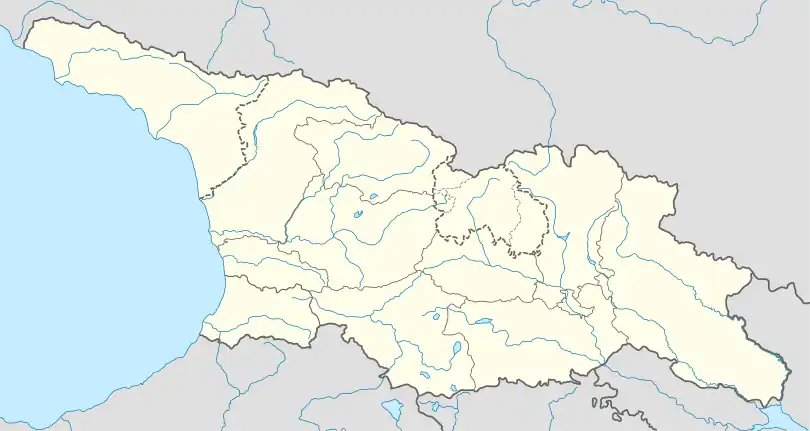Chazhashi
ჩაჟაში | |
|---|---|
Village | |
 Chazhashi in 2016 | |
 Chazhashi Location of Chazhashi | |
| Coordinates: 42°54′54″N 43°0′31″E / 42.91500°N 43.00861°E | |
| Country | |
| Region | Samegrelo-Zemo Svaneti |
| Municipality | Mestia |
| Elevation | 2,160 m (7,090 ft) |
| Population (2014)[1] | |
| • Total | 28 |
| Time zone | UTC+4 |
| Official name | Upper Svaneti |
| Criteria | Cultural: (iv)(v) |
| Reference | 709 |
| Inscription | 1996 (20th Session) |
| Area | 1.06 ha (2.6 acres) |
| Buffer zone | 19.16 ha (47.3 acres) |
Chazhashi (Georgian: ჩაჟაში) is a village in the Mestia Municipality, Samegrelo-Zemo Svaneti, Georgia. It is located in the southern foothills of the Greater Caucasus mountains, in the upper Enguri River valley, at the elevation of 2,160 m above sea level. The village is part of the historical region of Svaneti and center of the Ushguli community. Its medieval fortified structures are inscribed on the registry of Georgia's Immovable Cultural Monuments of National Significance and listed as a UNESCO World Heritage Site as part of the Upper Svaneti entity.[2]
Geography
Chazhashi is the main settlement of Ushguli, a conglomeration of four villages and one of the highest inhabited places in Europe. Under Georgia's current subdivision, it is part of the Mestia Municipality, located some 45 km west of the municipal center, the town of Mestia, at the confluence of the Enguri and Shavtskala rivers.[3]
Cultural heritage
Chazhashi is home to dozens of structures dating from the medieval and early modern periods of the history of Georgia, namely, its northwestern highland province of Svaneti. Of these are 13 well-preserved Svanetian tower houses—a typically three- to five-floor structures attached to the family houses—as well as four medieval castles, including one called Tamar's Castle in reference to the queen-regnant Tamar of Georgia (r. 1184–1213), who is believed by local folk tradition to have used it as her summertime residence. There are also two stone churches and several accessory buildings. The churches, one named St. George (Jgrag) and the other named the Lamaria (after the goddess Lamaria in Savneti mythology), date from the 10th and 11th–12th centuries, respectively.[4] The former is part of the Tamar Castle; the latter is frescoed.[3][4] Several monuments of Chazhashi were damaged by a massive avalanche in January 1987. Beginning in 2000, the Georgian government and the National Committee of the International Council on Monuments and Sites (ICOMOS Georgia), presided over multidisciplinary research of the village's cultural heritage and restoration and conservation projects.[2]
Population
Chazhashi is a village, with the permanent population of only 28 persons, all Svans, an ethnic Georgian subgroup, as of the 2014 nationwide census.
| Population | 2002 census | 2014 census |
|---|---|---|
| Total | 34[5] | 28[1] |
See also
References
- 1 2 "Population Census 2014: Number of Population by Administrative-Territorial Units and sex". National Statistics Office of Georgia. Retrieved 27 September 2016.
- 1 2 "Upper Svaneti". UNESCO World Heritage List. Retrieved 27 September 2016.
- 1 2 Abashidze, Irakli, ed. (1987). "ჩაჟაში (Chazhashi)". ქართული საბჭოთა ენციკლოპედია, ტ. 11 [Georgian Soviet Encyclopaedia, vol. 11] (in Georgian). Tbilisi: Metsniereba. pp. 82–83.
- 1 2 World Heritage List: Upper Svaneti -- No 709 (ICOMOS Report) (Report). ICOMOS. 28 October 1993. Retrieved 26 March 2022.
- ↑ "საქართველოს მოსახლეობის 2002 წლის პირველი ეროვნული საყოველთაო აღწერის შედეგები, ტომი II [Results of the first national census of the population of Georgia in 2002, volume II]" (PDF) (in Georgian). National Statistics Office of Georgia. 2003. Archived from the original (PDF) on 28 March 2016. Retrieved 15 August 2016.